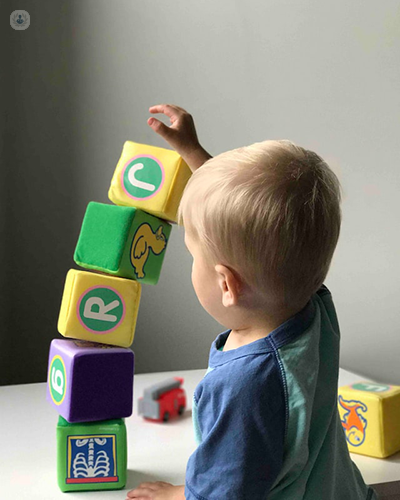Urinary tract infections in children: The signs and symptoms
Written in association with:While older children and teenagers may be able to tell of symptoms of urinary tract infections, such as pain or an increased frequency in needing the toilet, the signs can be difficult to spot in younger children and babies. In this informative article, highly respected consultant paediatric urologist Miss Marie-Klaire Farrugia offers expert advice for parents on the key symptoms of urinary tract infections in babies and children of all ages and when to see a doctor.

What are the symptoms of urinary tract infections in children?
This depends on the age of the child. Urinary tract infections (or UTIs for short) can be febrile (accompanied by fever over 38.5C) or non-febrile (also known as cystitis).
In babies, a high fever may be the only sign, and they often become unwell, lethargic and may refuse feeds. In older children, more commonly girls, there may be fever and other symptoms, including frequency (needing the toilet more often than normal), dysuria (stinging pain on passing urine), and unexpected wetting.
How serious can urinary tract infections in children become?
Untreated febrile UTIs may affect the kidneys and result in serious illness and sepsis, especially in babies, or in children with kidney reflux or other underlying urological or neurological disorders.
When should we see a doctor? How are UTIs diagnosed in children?
Any UTI suspicion should be investigated by testing a urine specimen. A urine dipstick is not enough as dipsticks often give false positive results in children. It is always wise to send the specimen to the lab for a culture and sensitivity, so that we can definitely confirm the UTI, identify the bug causing it, and hence target the treatment (with antibiotics).
Only symptomatic, culture positive UTIs should be treated with antibiotics. A positive dipstick alone is not an indication for treatment.
One positive UTI in a baby below 1 year is enough to trigger a consultation with a specialist, and further investigation – initially, this would be a renal tract ultrasound scan. In older children, we would normally investigate further if the UTI is recurrent, does not respond to treatment within forty-eight hours, is caused by an unusual bug, or is accompanied by concerning symptoms such as a poor or dribbling urinary stream, or a palpable bladder.
What can happen if a urinary tract infection is left untreated?
Delayed treatment of, or recurrent, febrile UTIs may result in scarring of the affected kidney.
What might recurrent urinary tract infections indicate?
Recurrent UTIs may be due to an underlying urinary tract abnormality, such as kidney reflux, a kidney blockage, or posterior urethral valves. They may also be secondary to bladder bowel dysfunction, which includes issues such as bladder overactivity (urinary frequency and urgency with day and night wetting) and constipation.
It is important to diagnose and treat the underlying cause of the UTIs, and this is where an expert paediatric urologist ought to be consulted.
If you are concerned about your child showing symptoms of a urinary tract infection and wish to schedule a consultation with Miss Marie-Klaire Farrugia, you can do so by visiting her Top Doctors profile.


